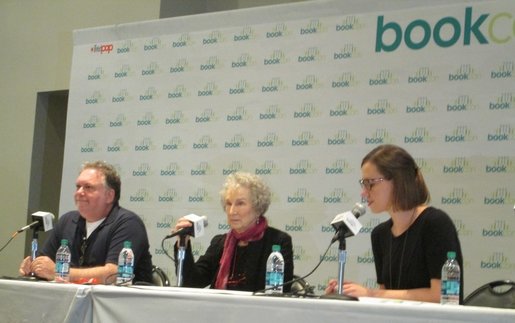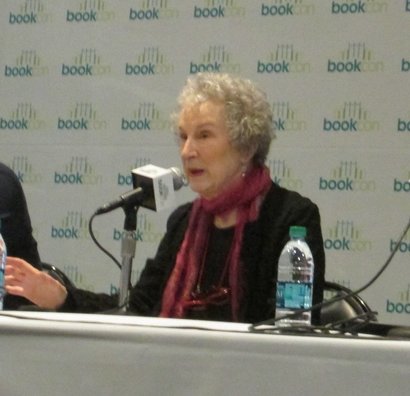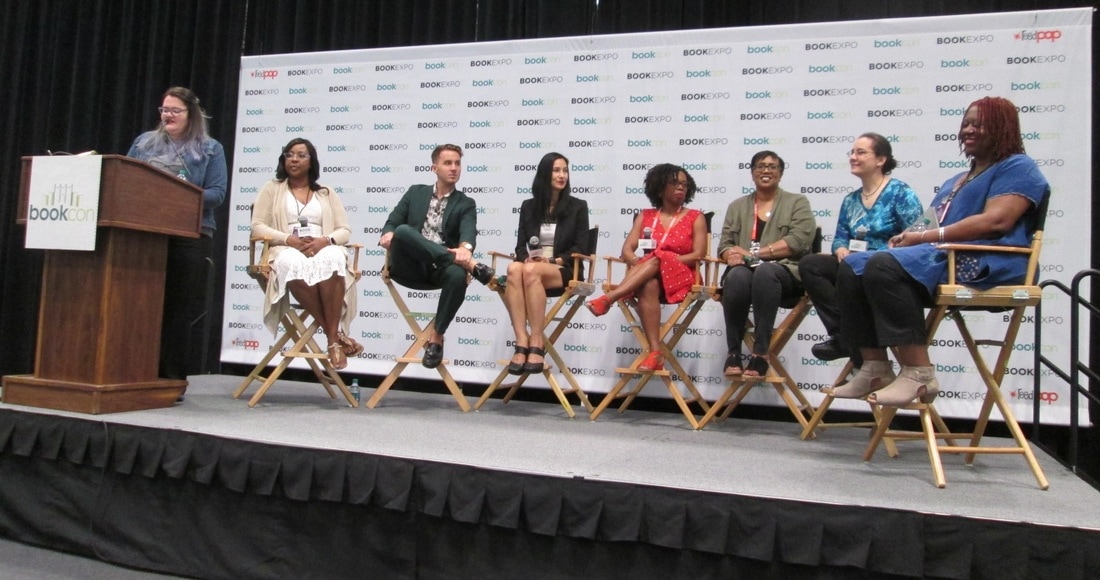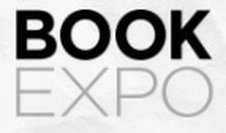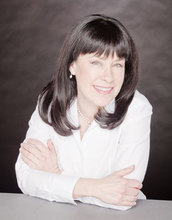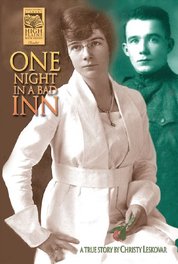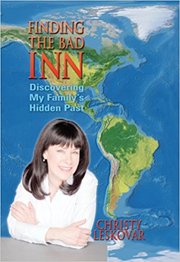 There are several measures of success that each writer dreams of happening. One, of course, is to complete writing a manuscript. Then there’s getting an agent, publisher and/or self-publishing. Afterwards is having the book become a bestseller. Following that is having the book made into a movie. While it’s rare that all these steps happen for most writers, I think it’s interesting to take a peek into the process. That’s why the final panel I attended at BookCon was “Transforming a Bestseller onto the Silver Screen: The Book to Film Experience.” [When I take notes at an event, I write it out longhand in a notebook, and I must say I'm not always the fastest transcriber around. I paraphrased the questions/answers that I didn’t manage to write down verbatim, but I tried to stick as closely as possible to what was asked/answered. All questions were asked by the moderator, MJ Franklin, with the exception of the audience questions at the end.]  R. J. Palacio R. J. Palacio The moderator started out with a question to break the ice. Question: What is your guilty pleasure movie? Stephen - The Room. R.J. – Chitty Chitty Bang Bang. Nicola – Harold and Kumar. Lauren – Dazed and Confused, Love Actually and The Princess Bride. Question: What was your first thought when you heard the news your book was going to be made into a movie? Lauren – “Online shopping!” Nicola – She didn’t believe it at first. “Then I bought a bottle of champagne.” R.J. – “It was like watching your kid take their first step.” It’s not one step, it’s a lot of little steps, in the process from book to movie. Question: What happens AFTER you hear your book’s going to be made into a movie? It takes years – one author said 4 years, one said 7+. Question: What’s happening in that 7 years? Lauren – “Well, that’s how long it takes people in Hollywood to read a book.” [Big laugh from audience.] Lauren – “Once it starts going, it can go really, really fast.” Stephen – “It really is a small miracle [that films get made]. … There really is no rhyme or reason. … It helps to have a fan base.” More books get made into movies than original screenplays. Nicola – The head of MGM’s daughter loved her book and wanted it to be a movie, so he said, “Okay.” Question: Stephen, you’ve been on all sides of the table. Do you sleep? What was it like directing Wonder [R.J. Palacio’s book] and working directly with the author? Stephen – “No” on the sleep question. He has a 2-year-old and 4-year-old, so he doesn’t sleep at all. [Got a laugh from the audience.] As to directing, he worked very closely with Raquel on Wonder. He asked her help and opinion a lot. Lauren – “So many writers are shut out [by directors]. … Creative writing is like romance. … You’ve got to pick your partner carefully.” Stephen – “The really smart directors – the best directors – it’s not true.” They don’t shut out the writers. Question: When changing mediums from book to movie – what new opportunities do you see in it? R.J. – “I love the idea of telling a story with as many audial and visual senses as possible.” Question: Does it make you approach writing your next book differently? Nicola – “The thing about writing your second book when your first book is doing well is that you hear everything that they [the readers] love about it and also everything they hate about it – because they will tell you.” Question: What do readers need to know about book/screen differences? Lauren – Scenes are filmed around location, not as a linear story, so filming jumps around in the story. Stephen – Quoted, “Art is a great lie that tells the truth.” Question: What about Easter eggs – what secrets do you put in your movies? Nicola – She and her family have a cameo in her movie. It’s 3 seconds in the movie, but it took 45 minutes to film. It was filmed with a drone and every time, her daughter would point at the drone. She would tell her daughter, “Honey, don’t point.” And then the next time the drone flew by – out went the hand. R.J. – Her son is in her movie. Stephen – Lots. For example, his wife is also a writer, and he had the main character reading her book. AUDIENCE QUESTIONS Question: Because your story is a personal thing to you, how do you know screenwriters won’t ruin it?
R.J. – “Blind faith.” Lauren/Nicola – They need to love it as much as you do. Question: How long do you revise before it’s ready? Stephen – “My advice to all young writers … you can recognize great writing before you can do it.” He asked the questioner how old he was – the man answered, “19.” Stephen advised that there are 4 steps to being a writer.
Question: Do you ever have to step back and not have as much control over your work? Lauren – When you get a letter from your editor, you go through it. “You have to learn as a writer how to listen, but only to the right people.” Every time, she goes through the 5 stages of grief. Rage is a long one for her. [Got a laugh from the audience.] It teaches you how to push yourself as a writer because it’s stuff you don’t know how to do. Question: Does seeing a movie make you reenvision your original vision of the book? Nicola – “It’s [a movie is] a new piece of art.” Question: How do you stay objective and how do you stay organized? Stephen – “There is no organization. It’s just how you apply time.” Nicola – “Writing is a muscle.” You have to exercise it. Lauren – “Anything you want to do is just work, plus time.” And that was everything I saw at BookCon! I learned a lot and was lucky enough to attend some really great panels. Hopefully, some of what these authors have said will be inspiring to others, too.
0 Comments
I don't often write about classic superheroes, mainly because I think that a lot of material has already been written reinforcing the genre. What I like to do is take something classic, though, and look at it from a different perspective. For example, if one person is a superhero, what about everyone else who isn't?
That is the basis of "Subhero," my new flash fiction story out today at Everyday Fiction. It's a story about how other people can be superheroes, even without powers or celebrity. I know I'm not supposed to pick favorites with stories, but this was one of my favorites to write. I hope you enjoy reading it. I have another flash story that just came out about superheroes and the people who have to live with them - "Rescued" at The Drabble. Hope you enjoy reading it!
This panel was the main reason I decided to go to BookCon in the first place. Margaret Atwood is one of my literary heroes. It's hard to find something she hasn't excelled at. She's a poet, she's a novelist, and she's a voice for Canadians, feminists and activists alike (although she would probably be the first to deny at least one out of three of those, probably two). And she has a wicked sense of humor to boot. My sister and I were both born in the north, and about half our extended family still call it home. Our grandmother in particular was what I feel epitomizes Canada to me - she set a formal table, had afternoon tea, and could say outrageously funny things in the most unfailingly polite way. Both my sister and I were lucky enough to attend Ms. Atwood's panel, and both of us at the end of it turned to each other and said, "Grandma." Ms. Atwood had the audience laughing at her deadpan and outrageous humor. The official title of the panel was: "The Handmaid's Tale: Margaret Atwood and Showrunner Bruce Miller from the New Series on Hulu." 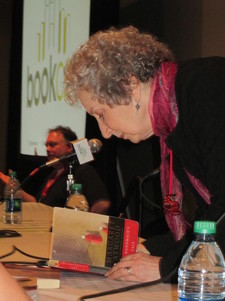 Like my other posts about BookCon, I have the standard disclaimer: When I take notes at an event, I write it out longhand in a notebook, and I'm not always the fastest transcriber around. I paraphrased the questions/answers that I didn’t manage to write down verbatim, but I tried to stick as closely as possible to what was asked/answered. Anything in quotes is straight out of the horse's mouth. All questions were asked by the moderator, Madeleine Crum, with the exception of the audience questions at the end. Question: The Handmaid's Tale was recently re-released with a new introduction. What deterred you from the science fiction genre and what made you decide to eventually write it? Margaret - "1984 had a lot of cleavage and leering on the cover" to attract readers in the 50s. She still has her original copy from when she was a kid. She was born in 1939 when WWII was beginning, so it was a formative experience for her. There were lots of comic books and radio drama, but no TV. "[I] grew up in the woods and was not properly socialized." She didn't care if no one liked what she read. "My dad liked to read sci-fi because he thought it was funny. ... I liked them, but I didn't feel like I could write them." Three things made her do it:
Question: What other historical references other than the Bible influenced The Handmaid's Tale? Margaret - Everything in it is based on real events. Question: How and when did you both get involved in the adaption? Bruce - "[I] read [the] book in college ... attracted to it as a work of literature ... the fact she could maintain ... resistance, sense of self," etc. They were looking for a female show writer but he really wanted the job and they "worked it out." Margaret said, "We can fix that," when he said, "I was a boy." [Audience laughed at this.] "Unfortunately, all the things that Margaret mentioned in the book can still be found happening around the world today." Question: How is the book relevant to [U.S.] politics today? Bruce - He started writing episodes before the primaries even began, and was filming on election day. Margaret - "[No one's] a bad guy in their own mind. ... There are very few people who think they're a bad guy." You're "only as good as your villain." Question: What about activism? Margaret - "First of all, I'm not a real activist ... they get paid." Then she joked about how she doesn't really have a job, so she can't get fired - she's just a writer. In a totalitarian society, she'd just get shot. She's still here, so we're not there yet. Bruce - Feels out of his depth. He's a news junkie, but doesn't feel adept enough to comment. At this point, the conversation took an unexpected turn from politics to perception. The way it came out was talking about advertising and feminine products, and, as Ms. Atwood put it, how euphemism can get people in trouble. Margaret - Euphemisms are "the beginning of surrealism." Question: There are some differences between the book and the show. Why did you choose to get more in the other characters' heads on the show? Bruce - "Just decided to follow my curiosity. ... All the satellite events that happen all go back to her [Offred]." Margaret - "In the book, they're all open questions." Question: Another difference is that there is some climate change in the book, but it's much bigger in the show. People are more conscious of it. Why? Bruce - You can't make Gilead into everything you hate. If they're trying to combat infertility, they're trying to protect the environment. Question: Are there any thematically related books or TV shows you'd recommend? Margaret - The Rise of the Nazi Party. [TV mini-series.] Bruce: The Rise and Fall of the Third Reich. [Book.] AUDIENCE QUESTIONS Question: Where do we go from here? We're heading towards totalitarianism.
Margaret - "I'm not really a visionary. I'm not a prophet. Sometimes people have to live their dream" even if the dream isn't what they expected. In the state of Texas, it's impossible to have abortions now. "It really is a form of slavery to force women to have children they can't afford." She's waiting for the lawsuits of women suing to have the state pay for their unwanted children. Question: One of the things the audience member asking the question always found the most creepy was the epilogue in the book. It's the far future looking back, and it says that we can't judge the oppressors for their actions, since we aren't them. Margaret - "If you read history books, you will find those kind of things." And it's true - it's hard to judge a time, since we weren't there. Bruce - "The writing staff - we're incredibly judgy." [Got a laugh from the audience.] Question: Human beings say that they would never do something like this. At what point do we know we're at that turning point? Margaret - "You can't know ... the future doesn't exist. It's an infinite number of possible futures." Question: Should everyone read the book if they've only watched the show? Margaret - "Telling everyone to read my book sounds incredibly self-serving, doubly so because I'm Canadian." [Got a laugh from the audience.] "You're never there in the room at the same time someone's reading it as when you're writing it." So just write it - no one will read it unless you give it to them. Bruce - "I tend to write things that I just can't not write." And that's a good note to end on - writers write the stories that must be told, no matter what. Even if it gets them in trouble. All you have to do is reach one reader, and you've succeeded. NEXT IS THE LAST BLOG POST ABOUT BOOKCON: Part 4 will be about Transforming a Bestseller onto the Silver Screen: the Book to Film Experience. My first love in reading and writing has always been genre fiction. By that, I mean science fiction, fantasy and horror. These are what inspired me to write in the first place. So if there's a panel with some awesome writers in the genre, sign me up! The second panel I attended at BookCon was put on by Tor, one of the giants of genre publishing, and looked to be right up my alley. I wasn't disappointed, either. The four panelists (pictured below) had the audience constantly cracking up with their dry and often self-deprecating humor. 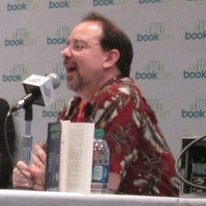 John Scalzi John Scalzi The subject of the panel was Resistance in Science Fiction. And the panelists were eager to explain what resistance meant to them and how they tried to implement it in their writing. [When I take notes at an event, I write it out longhand in a notebook, and I must say I'm not always the fastest transcriber around. I paraphrased the questions/answers that I didn’t manage to write down verbatim, but I tried to stick as closely as possible to what was asked/answered.] There wasn't a moderator, although the panelists took turns asking questions to help keep the discussion moving. The first question/statement was about whether politics had any place in science fiction, referring to the recent behind-the-scenes conflict in genre fiction between conservatives and liberals. This sparked a number of jokes, in addition to some deeper discussion of the subject. Annalee – "Basically by lying and setting our books in alternate history and in the future, we can tell stories we can't tell with nonfiction." Cory – "One thing science fiction can do is not predict the future, but give us a direction to head towards." John – SFWA (Science Fiction Writers of America) always had political conflict. During the Vietnam War, half of the organization took out a full page ad supporting the war. And the other half took out an ad against the war. Mr. Scalzi gets emails from readers who disagree with him politically and say they won't read his books anymore. He sends back an email saying, "Kiss my ass." Annalee – "Politics are a huge part of our lives and that's what makes it interesting. … Humans are into conflict." Charlie – "There's no way to depoliticize science at this point. … People have different views of science in politics. … Science fiction is about the future, but writers and readers live today." Charlie – "How can we as science fiction writers give people the tools to resist?" 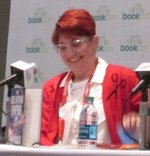 Annalee Newitz Annalee Newitz Annalee – "What I like to see in science fiction and what I try to do … [are] when things aren't as black and white." Like speaking up at a racist statement made by a co-worker/boss and losing your job – that is an ambiguous problem. "A complicated character in science fiction can't just be Superman." Cory – "I think there's something that changed in science fiction and technology. … [A] vein of technorealism now coming up in science fiction. … Science fiction is engaging with technology that people use in their lives" every day, like computers. John – Being a straight, rich, white male, "I am not the right person to write resistance from lots of different viewpoints. … The literature of resistance that comes out of me is from where I am." [Got a round of applause from the audience.] Charlie – "I think we should do much more to … decolonize our field." Talked about what she termed "wonk-punk," – books that are wonky, like about tax law, etc. that fall outside the direct genre boundaries. John – Do writers have the duty as individuals to be a beacon? 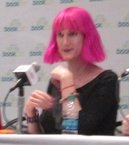 Charlie Jane Anders Charlie Jane Anders Charlie – "As a visible transgender person who is dealing with my shit, I think I am making a statement just by existing." [Got a round of applause from the audience.] Cory – The way he decides how to balance the actions in his life is by asking himself the question: "Will I regret this on my deathbed?" AUDIENCE QUESTIONS 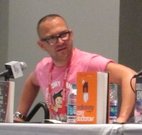 Cory Doctorow Cory Doctorow Question: How are science fiction and fantasy received in non-democratic countries? John – "Circumstances on how the reader reads the book will have an influence on them." Readers find things in the work that the writer didn't mean to put in there. Cory – The internet helps propagate science fiction in non-democratic countries. Annalee – Also, these authoritarian places produce some great science fiction. Question: What about gender in science fiction? Annalee – "Expectations [are] based on gender," but genders aren't assigned. John – As an experiment, he wrote a book with Chris, an ungendered character, to see how people would react. Women were evenly split. Half thought the character was female, half thought male. But with men, it was about 97% who thought Chris was a dude, which he thought was interesting. Question: How can a writer characterize oppressors? Charlie – "It is important to get into the heads of all your characters. … What's interesting about fiction is it lets us identify with villains as well as heroes." John – "Very few people ever think they're the bad guy." NEXT BLOG POST: Part 3 will be about Margaret Atwood's panel on The Handmaid's Tale.  I have three kids, so I don't often get to go to writers' events. Once in a while, I'll go to an author reading, but it will have to be pretty darn special to lure me out. For example, one of my literary heroines giving a talk in New York City – that would do it. Especially if that speaker were Margaret Atwood. I first read Ms. Atwood's writing when I was a teenager – I started out with her best-known novel, The Handmaid's Tale. I won't spoil it for those who haven't read it, since I think it's a must-read, but it's a chilling tale about cultural, social and religious trends carried too far. So when I found out a few weeks ago that Margaret Atwood would be one of the speakers at BookCon, I signed up at the last minute and asked my sister to accompany me (who is also a fan of Ms. Atwood). Ms. Atwood's panel was near the end of the day, but there were so many fantastic writers there that it was hard to choose which panels to attend. I'm going to break up this blog post into four parts – one for each panel I went to. There was a lot of great advice, plenty of humor, and a sneak peek into the writing and publishing trends of today. Within the past year, I've started writing a new genre – romance. And being half-Japanese, I like to include diversity in my stories. So a natural panel for me to attend was called "Diversifying Love." It was packed with eight romance writers from a variety of backgrounds and styles. They are pictured below. From left to right: Sarah MacLean (moderator), Tracey Livesay, Seth King, Mara White, Nicole Blades, K.M. Jackson, Cecilia Tan, Denny Bryce.
When I take notes at an event, I write it out longhand in a notebook, and I must say I'm not always the fastest transcriber around. I paraphrased the questions/answers that I didn’t manage to write down verbatim, but I tried to stick as closely as possible to what was asked/answered. Anything in quotes is straight out of the horse's mouth. All questions were asked by the moderator, Sarah MacLean, with the exception of the audience questions at the end. Question: Why write romance? Tracey – "I write romance because it's what I love to read. … I believe in happily ever after. … I believe in love. … It's what makes the world a better place, honestly." Seth – "It's an essentially human thing." Mara – "No matter what I was reading … it was the relationship that spoke to me the most." Nicole – [Romance is] "… the search for ourselves." K.M. – "I was always drawn to the love story, no matter what genre I read. … Romance was an easy fit for me." Cecilia – "Started out as a science fiction writer. … I always wrote to change the world. … It's [writing romance] the most effective tool in making the world a better place." Denny – "Buffy the Vampire Slayer fan fic … led me to writing romance." [This got a big cheer from the audience.] Question: Talk a little bit about the kind of stories you go for – what are your core stories? Seth – "Death." It stays with you. He's moved by the darker stories, the macabre – it makes things more powerful. "I remember what devastated me." K.M. – "I always go back to the stories of hope and redemption and forgiveness in my stories. I like to have battles between my characters, break them apart, bring them back together." Mara – "Culture clashes." Tracey – "Overcoming issues in your childhood" because she "watched a lot of Oprah" growing up. Denny – "Family, trust and status. … I love tortured heroes, I love tropes." Nicole – "Identity, family, for sure, and the search for our best selves and through that comes up the top of reinvention … compassion … I'm very, very interested in that." Question: Do you feel like you're imbuing your work with your politics, the way you want the world to be? Cecilia – "Yes!" [Got a laugh from the audience.] Tracy – "The personal is political." Race isn't the central conflict, other things are. Race is background. K.M. – "I'm not writing about the way the world should be, but the way it is." Puts in African American women having fun, lighter rom coms – why not? It's normal. "That might come up as being political … that's just life." Cecilia – "Marginalized people … mainstream [fiction] only wants to see their pain. … Romance isn't about that. … Happiness is a part of our story, too." Question: What's the power of happily ever after and what's the power of NOT happily ever after? Cecilia – Happy ever after is the "safe space." Tracey – "Women like me are worthy of the happy ever after." Seth – "I like to make room for reality and show things the way they are in order to make them better." NOT happy ever afters. Nicole – "I don't think I'm against the happy ending. … In life, you don't always get the happy ending." She goes "where the characters take me." K.M. – "Romance was always an escape, a way of self care. … I look for those happy endings," but don't like them TOO sweet. Question: How do readers respond to happy ever after versus not happy ever after? K.M. – "I like dark books. I love the struggle. … Whatever it is you want to read, it's being written." Question: Let's talk about sex. This is where romance sort of lives. We are the genre that produces it. Cecilia – "My core story is sex as transformation … sex as the way you escape the box that society tries to put you in." Mara – "Personally, as a writer, it's more of the buildup to the sex rather than the actual act itself." K.M. – "There's nothing worse than reading a bad sex scene. … Writing the sex scenes are the hardest part. … Often romance gets trashed for the sex scene and that just burns me." It's hard to do well. Tracey – "It's not about the sex, it's about women being pleasured in sex. … That's the problem … that we're writing about [is] women enjoying sex." Question: Where do we go from here? What do we think should come next? Seth – "Forward. … More stories are coming into the center. Forward is where I'd like to go." Cecilia – "Writers … and readers … go outside your comfort zone. … You vote with your dollars." Mara – "Having books that reflect the world we live in." K.M. – "I'd like to see a lot more choice for readers." AUDIENCE QUESTIONS Question: Do you believe there can be too much diversity? Everyone on the panel – "No!" Question: How to move forward with so much hostility nowadays towards marginalized communities? Seth – He has a book cover with two men kissing. "If you have to resort to shock value, then do it." Haters will hate. K.M. – She tweets #weneeddiverseromance. Her books are sold side by side with white writers, not separated. Before, black writers would be market together and white writers together. Now, she's just another name on the list of both black and white writers. Question: To Seth – have you experienced any hostility from religious people, etc.? Seth – "Yes, I got death threats … [but] if you can reach even one person, it's worth every death threat." Question: Nowadays, there is an assault on first amendment rights. What to do? Cecilia – "Fiction writers are a bit more protected than journalists … [we] can say it's only a story, but that's why stories are so important." Question: What about writing diversity if you're not diverse? Nicole – "Something to be said for writing what you don't know. It forces you out of your comfort zone … and to look at human beings as human beings." Question: Recommend your most impactful romances you read? [Unfortunately, I didn’t hear every writer's answer. But here are a few that were recommended.] Seth – Eleanor & Park by Rainbow Rowell. Nicole – Nicola Yoon. K.M. – Alyssa Cole, Piper Huguley, Farrah Rochon, Phyllis Bourne, Synithia Williams. Cecilia – Alisha Rai/Alicia Rae?, L.A. Witt. Denny – Romance Novels in Color – a good resource run by Laurel Cremant. Tracey – Nalini Singh. NEXT BLOG POST: Part 2 will be about the Tor Science Fiction and Fantasy Panel, which was focused on resistance in science fiction. It's hard to create a story arc in 100 words, but I love the challenge. 101 Fiction publishes an issue of themed speculative fiction drabbles each quarter - 100 words for the story and 1-word titles. Recently, my story "Pretty" was published for the "Devils and Demons" Issue 15. I decided to bring in a bit of my heritage and examine a demon that is unique to Japan. I hope you enjoy reading it!
Anyone who has read my blog knows how much I love flash fiction. I actually just wrote a blog post about the subject for an international writer's collective where I am a member, called Reader's Abode. My blog is about ten of my favorite free flash fiction magazines (actually eleven, because I cheated and snuck an extra one in). They are all amazing magazines, and I definitely recommend them.
I'm also lucky enough to have my own flash fiction published once in a while. Today, two of my short shorts were published, and both are free to read online. The first is a drabble (a story of 100 words) called "Reciprocal," published in Microfiction Monday Magazine. It's a story that I wanted to tell, but it was hard to write, considering the subject matter. The next one is slightly longer, nearly the flash fiction limit of 1,000 words. Called "The Separation," it was published in Five on the Fifth today. It was also an emotionally tough story to write, but in a different way than "Reciprocal." Both of these stories are ones that I thought should be told and have resonance to me, as a person and as a writer. I hope you enjoy reading them. |
Who the heck is Alison McBain?I am a freelance writer and poet with over two hundred short pieces published in magazines and anthologies. Check out my 2024 writing challenge to write a book a week at Author Versus AI. For more info, please check out my "About Me" page. © Alison McBain. All rights reserved
Archives
July 2024
|





